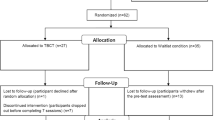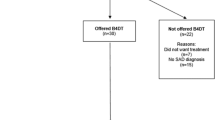Abstract
We examined the efficacy of a brief CBT (bCBT) in 53 patients with social anxiety disorder (SAD). Patients were randomized to either bCBT plus treatment as usual (N = 27) or TAU only (N = 26). Seven sessions of bCBT (Wells and Papageorgiou in Behavior Research and Therapy, 39, 713–720, 2001), were delivered. The primary self-report outcome was the Social Interaction and Anxiety Scale (SIAS) and the primary rater-based outcome was the Liebowitz Social anxiety scale (LSAS). “Response” to treatment was assessed using the Clinical Global Impressions–Improvement. Assessments were carried out at baseline, post-treatment, and 3 months for the bCBT group and at baseline and post-treatment for the TAU group. There were 23 treatment completers in the bCBT group. Linear-mixed model ANOVAs indicated superiority in change following bCBT, on the LSAS, SIAS, and the Clinical Global Impressions (CGI)-severity. The TAU group improved on CGI-severity and Social Phobia Rating Scale (SPRS) self-attention. At post-treatment, 65% of bCBT cases and 4% in TAU met criteria for “recovered”, supporting the effectiveness of bCBT in the treatment of SAD.
Clinical Trial Registry number: CTRI/2012/09/003015

Similar content being viewed by others
References
American Psychiatric Association. (1994). Diagnostic and Statistical manual of mental disorders (4th ed.). Washington, DC: American Psychiatric Association.
Beck, A. T., Robert, A. S., & &. Brown, G. K. (1996). Beck depression inventory-II. San Antonio.
Blanco, C., Schneier, F. R., Schmidt, A., Blanco-Jerez, C. R., Marshall, R. D., Sanchez-Lacay, A., et al. (2003). Pharmacological treatment of social anxiety disorder: a meta-analysis. Depression and Anxiety, 18, 29–40.
Brown, E. J., Turovsky, J., Heimberg, R. G., Juster, H. R., Brown, T. A., & Barlow, D. H. (1997). Validation of the social interaction anxiety scale and the social phobia scale across anxiety disorders. Psychological Assessment, 9, 21–27.
Bruce, S. E., Yonkers, K. A., Otto, M. W., Eisen, J. L., Weisberg, R. B., Pagano, M., Shea, M. T., & Keller, M. (2005). Influence of psychiatric co morbidity on recovery and recurrence in generalized anxiety disorder, social phobia, and panic disorder: a 12-year prospective study. American Journal of Psychiatry, 182, 1179–1187.
Clark, D. M., & Wells, A. (1995). A cognitive model of social phobia. In R. Hiemberg, M. Liebowitz, D. A. Hope, & F. R. Schneier (Eds.), Social phobia: Diagnostic assessment and treatment (pp. 69–93). New York: Guildford Press.
Clark, D. M., Salkovskis, P. M., Hackmann, A., Wells, A., Ludgate, J., & Gelder, M. (1999). Brief cognitive therapy for panic disorder. A randomized controlled trial. Journal of Consulting and Clinical Psychology, 67, 583–589.
Clark, D. M., Ehlers, A., McManus, F., Hackmann, A., Fennell, M., Campbell, H., Flower, T., Davenport, C., & Louis, B. (2003). Cognitive therapy versus fluoxetine in generalized social phobia: a randomized placebo-controlled trial. Journal of Consulting and Clinical Psychology, 71, 1058–1067.
Cohen, J. (1988). Statistical power analysis for the behavioral sciences. New York: Academic Press.
Cottraux, J., Note, I., Albuisson, E., Yao, S. N., Note, B., Mollard, E., et al. (2000). Cognitive behavior therapy versus supportive therapy in social phobia: a randomized controlled trial. Psychotherapy and Psychosomatics, 69, 137–146.
Craske, M. G., Maidenberg, E., & Bystritsky, A. (1995). Brief cognitive-behavioral versus nondirective therapy for panic disorder. Journal of Behavior Therapy and Experimental Psychiatry, 26, 113–120.
Enders, C. K. (2010). Applied missing data analysis (pp. 51–52). New York: Guilford Press.
Feske, U., & Chambless, D. L. (1995). Cognitive behavioral versus exposure only treatment for social treatment: A meta-analysis. Behaviour Research and Therapy, 26, 695–720.
First, M. B., Spitzer, R. L., Gibbon, M., & Williams, G. B. W. (1995). Structured Clinical Interview for DSM-IV Axis I disorders, Patient Edition. (SCID I/P, version 2.0) (p. 1995). New York: Biometrics Research, New York State Psychiatric Institute.
First, M. B., Gibbon, M., Spitzer, R. L., Williams, J. B. W., & Benjamin, L. S. (1997). Structured clinical interview for DSM-IV Axis II personality disorders, (SCID-II) (p. 1997). Washington, D.C.: American Psychiatric Press, Inc..
Foa, E. B., Hearst-Ikeda, D., & Perry, K. J. (1995). Evaluation of brief cognitive- behavioral program for the prevention of chronic PTSD in recent assault victims. Journal of Consulting and Clinical Psychology, 63, 948–955.
Gaston, J. E., Abbott, M. J., Rapee, R. M., & Neary, S. A. (2006). Do empirically supported treatments generalize to private practice? A benchmark study of a cognitive-behavioral group treatment programme for social phobia. The British Journal of Clinical Psychology, 45, 33–48.
Gil, P. J. M., Carrillo, F. X. M., & Meca, J. S. (2001). Effectiveness of cognitive-behavioral treatment in social phobia: a meta-analytic review. Psychology in Spain, 5(1), 17–25.
Guy, W. (1976). ECDEU Assessment Manual for Psychopharmacology, US Dept Health, Education, and Welfare Publication (ADM) 76–338 (pp. 218–222). Rockville: National Institute of Mental Health.
Heimberg, R. G. (2002). Cognitive behavioral therapy for social anxiety disorder: current status and future directions. Biological Psychiatry, 51, 101–108.
Herbert, J. D., Rheingold, A. A., & Goldstein, S. G. (2002). Brief cognitive behavioral group therapy for social anxiety disorder. Cognitive and Behavioral Practice, 9, 1–8.
Herbert, J. D., Gaudiano, B. A., Rheingold, A. A., Myers, V. H., Dalrymple, K., & Nolan, E. M. (2005). Social skills training augments the effectiveness of cognitive behavioral group therapy for social anxiety disorder. Behavior Therapy, 36, 125–138.
Jørstad-Stein, E. C., & Heimberg, R. G. (2009). Social phobia an update on treatment. Psychiatric Clinics of North America, 32(3), 641–663.
Kessler, R. C., McGonagle, K. A., Zhao, S., Nelson, C. B., Hughes, M., Eshleman, S., et al. (1994). Lifetime and 12 month prevalence of DSM-III-R psychiatric disorders in the national co morbidity survey. Archives of General Psychiatry, 51(8–19), 8.
Liebowitz, M. R. (1987). Social phobia. Modern Problems of Pharmacopsychiatry, 22, 141–173.
Lincoln, T. M., Rief, W., Hahlweg, K., Frank, M., von Witzleben, I., Schroeder, B., & Fiegenbaume, W. (2003). Effectiveness of an empirically supported treatment for social phobia in the field. Behavior Research and Therapy, 41, 1251–1269.
Magee, W. J., Eaton, W. W., Wittchen, H. U., McGonagle, K., & Kessler, R. C. (1996). Agoraphobia, simple phobia, and social phobia in the National co morbidity survey. Archives of General Psychiatry, 53, 159–168.
Mattick, R. P., & Clarke, J. (1998). Development and validation of measures of social phobia scrutiny fear and social interaction anxiety. Behaviour Research and Therapy, 36, 455–470.
McEvoy, P. M. (2007). Effectiveness of cognitive behavioral group therapy for social phobia in a community clinic: a benchmarking study. Behaviour Research and Therapy, 45, 3030–3040.
Mörtberg, E., Clark, D. M., Sundin, O., & Wistedt, A. (2007). Intensive group cognitive treatment and individual cognitive therapy vs. treatment as usual in social phobia: a randomized controlled trial. Acta Psychiatrica Scandinavia, 115, 142–154.
NCCMH. (2013). Social anxiety disorder: The NICE guidline on recognition, assessment and treatment. Leicester: The British Psychological Society and the Royal College of Psychiatrists [Full Guidleine].
Otto, M. W., Pollack, M. H., Gould, R. A., Worthington, J. J., McArdle, E. T., Rosenbaum, J. F., & Heimberg, R. G. (2000). A comparison of the efficacy of clonazepam and cognitive-behavioral group therapy for the treatment of social phobia. Journal of Anxiety Disorders, 14, 345–358.
Power, K. G., Simpson, R. J., Swanson, V., & Wallace, L. A. (1990). A controlled comparison of cognitive-behavior therapy, diazepam, placebo, alone and in combination for the treatment of generalized anxiety disorder. Journal of Anxiety Disorders, 4, 267–293.
Primakoff, L., Epstein, N., & Covi, L. (1986). Homework compliance: an uncontrolled variable in cognitive therapy outcome research. Behavior Therapy, 17, 433–446.
Rapee, R. M. (1995). Descriptive psychopathology of social phobia. In R. G. Heimberg, M. R. Liebowitz, D. A. Hope, & F. R. Schneiner (Eds.), Social phobia: Diagnosis, assessment, and treatment (pp. 41–66). New York: Guildford Press.
Rapee, R. M., & Heimberg, R. G. (1997). A cognitive behavioral models of anxiety in social phobia. Behaviour Research and Therapy, 35, 741–756.
Salabeeria, K., & Echeburua, E. (1998). Long term outcome of cognitive therapy's contribution to self-exposure in vivo the treatment of generalized social phobia? Journal of Anxiety Disorders, 22, 262–284.
Scott, C., Tacchi, M. J., Jones, R., & Scott, J. (1997). Acute and one-year outcome of a randomized controlled trial of brief cognitive therapy for major depressive disorder in primary care. The British Journal of Psychiatry, 171, 131–134.
Wells, A. (1997). Cognitive therapy of anxiety disorders: A practice manual and conceptual guide. Chichester: Wiley.
Wells, A. (2009). Metacognitive therapy for anxiety and depression. New York: Guilford Press.
Wells, A., & Matthews, G. (1994). Attention and emotion: A clincal perspective. Hove: Erlbaum.
Wells, A., & Papageorgiou, C. (2001). Brief cognitive therapy for social phobia: a case series. Behaviour Research and Therapy, 39, 713–720.
Wilson, J. K., & Rapee, R. M. (2005). The interpretation of negative social events in social phobia: Changes during treatment and relationship to outcome. Behaviour Research and Therapy, 43, 373–389.
Acknowledgement
The authors thank Dr. D. K. Subbakrishna and Dr. Veena Satyanarayana for their inputs on the study.
Author information
Authors and Affiliations
Corresponding author
Ethics declarations
The study was approved by the Institute Ethics Committee and all patients gave written informed consent to participate. Patients did not receive any monetary benefits for participating in the study.
Conflict of Interest
None.
Rights and permissions
About this article
Cite this article
Pinjarkar, G.R., Sudhir, P.M., Mariamma, P. et al. Brief Cognitive Therapy Plus Treatment as Usual for Social Anxiety Disorder: a Randomized Trial of Adults in India. J Cogn Ther 11, 299–310 (2018). https://doi.org/10.1007/s41811-018-0025-x
Published:
Issue Date:
DOI: https://doi.org/10.1007/s41811-018-0025-x




